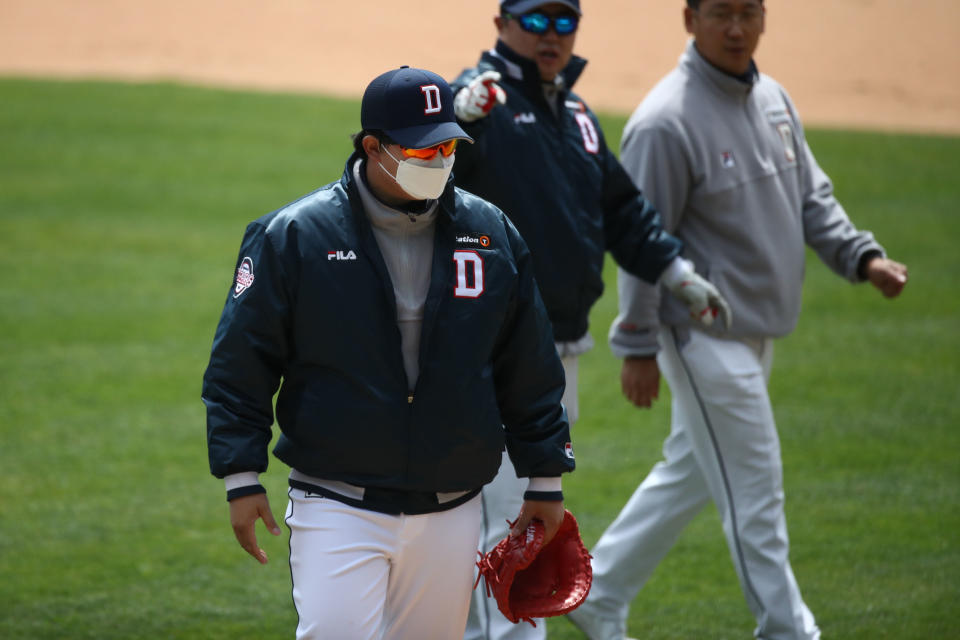MLB will be watching as KBO tries to bring back baseball amid coronavirus recovery
After too many dark weeks, long after they’d shuttered spring training sites, and then as opening day passed and all of April did too, Major League Baseball officials are increasingly optimistic about a 2020 season.
Perhaps they’ve simply wearied from the weight of the pessimism, if not theirs then that of so many others, and perhaps the coronavirus appears to be losing some of its topspin, and perhaps they no longer have to watch the evening news through their own fingers.
Regardless, by the end of April those officials had allowed themselves to dream of summertime baseball games, and on their own soil. The games probably wouldn’t be perfect. The stadiums probably would be empty. Some of the cities that surround those stadiums might still be too risky, even for the teams alone. There remained a thousand details to sort out. There would be a cost for being wrong. What comes — or not — will have to do, perfect or otherwise.
They waited for signs they could lift their gaze to something other than the lockdown routine of a new — and presumably temporary — life. Stay-at-home measures were easing, for better or worse. Some states began to manage the worst of the pandemic. It was hard to know who to believe, and that’s assuming there is someone to believe, and so even amid burgeoning optimism there remained the waiting. For testing. For relief. For a vaccine. For some distant tomorrow.
The day has not yet come for baseball in America.
There will, however, be baseball in South Korea. On Tuesday, the 10-team Korea Baseball Organization is scheduled to open with five games in five stadiums.
The next best thing to navigating your own pandemic, creating your own protocols, weighing your own needs against those of the people you could be putting in danger and inching back out into an uneasy world is, basically, to have someone else do it first. And to take notes.
In terms of curve flattening and people testing, South Korea is at least weeks and more likely months ahead of the United States, according to many analysts.
The KBO will play its games in empty stadiums, as does the five-team, Taiwan-based Chinese Professional Baseball League, which started its season four weeks ago.

Among the KBO protocols, many of which mirror the CPBL’s: players and staff will enter and exit facilities through one door, where their temperatures will be taken; all personnel not in baseball uniforms are required to wear masks and gloves; a player who shows symptoms will be quarantined and the stadium where he last played will be closed; a positive test would lead to contact tracing, more quarantines if necessary and a possible league-wide shutdown for three weeks or longer; no spitting; no high-fives.
Its season delayed six weeks because of the coronavirus, the KBO will operate on the narrowest of edges, balanced between the entertainment it provides for a wrung-out nation and the risk potential — for the league and beyond — of too many people in too small a space.
[A primer on the KBO: How to enjoy one baseball league’s return]
Major League Baseball has two employees based in Seoul. They operate out of a WeWork space. They’ll be busy. MLB also has an international department based in New York, part of which is dedicated to baseball in Asia. Between the Seoul presence and its central offices, MLB will monitor the league and be in regular contact with KBO officials, curious as to how a nation straps a baseball season to the fumes of a pandemic.
The differences are in the sheer numbers. Across Korea, 10,774 known virus cases and 248 deaths. In the U.S., 1.1 million cases and more than 64,000 dead. (Japan, whose baseball season is suspended indefinitely, has counted 14,516 cases and 466 deaths.) The U.S. has about six times the population of Korea and twice that of Japan.
Along with the particulars of virus prevention and protection, including travel, media, staffing, security and stadium operations, MLB has an interest in how the KBO presents itself on television. Will the players be mic-ed? The umpires? Will there be more cameras? How does it avoid shots of an empty stadium? No one will watch to be reminded of the time we’re in, even when Korea’s usually boisterous crowds will be missed.
The KBO intends on playing its full 144-game regular season, in spite of the delayed start. The season would run to Nov. 2. The playoffs would begin two days later. Postseason games after Nov. 15 would be held in a domed stadium in Seoul.
Getting there, navigating every single day, surviving that, will be the hard part. It’ll require uncommon vigilance. The same kind of luck.
MLB will be watching, learning, leaning in, watching the games, attending the games, strategizing on its own, waiting some more, and then hoping its optimism is founded.
More from Yahoo Sports:


